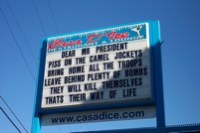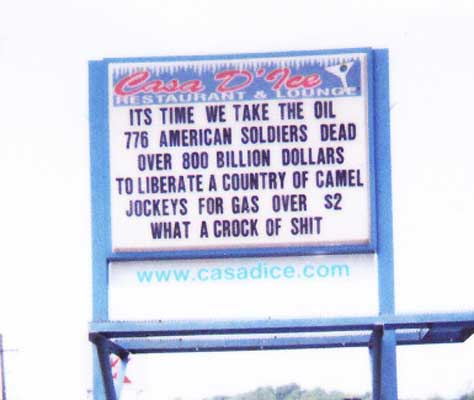After September 11th, the sign board became a way for suburban America to express solidarity. All down any given highway you could see hundreds of small storefronts asking us to pray for the victims, to support our troops, and in some cases crying out for vengeance. For some reason, I was transfixed by this. Something about the grass-roots nature of it moved me. I’m kicking myself for not taking more photos of them at the time.
Several years later, this has mostly died down, but occasionally there’s someone who still uses this medium in a particularly attention grabbing way; here’s one of them. I meant to take a picture of this sign a few weeks ago, when it had a provocative rant about Iraq and gas prices. But before I remembered to bring my camera when passing it, it had changed to something less interesting. Fortunately, this week’s return of the phrase “camel jockey” makes it worth sharing.
It’s an interesting sentiment, and I think it is representative of the fundamental split between our leadership and their base. Unlike the justified and measured retribution the US engaged in in Afghanistan, the Iraq war is unquestionably an imperial adventure. By this I mean that it is an enterprise that is of no demonstrable present value to the United States (it may give some benefit to the Iraqis themselves, or to the Kurds, or to history, or give some unquantified future value to the US), although it certainly has involved incredible cost in both blood and treasure. Patriotic Americans, by and large, understood exactly the trade off involved in the Afghanistan war, and understood the motivation. No one — at least, no one unwilling to use the word “empire” — has provided sufficient justification for the Iraq war that is both reasonable and truthful.
Imperial ambitions, of the very sort that George Washington warned us about, are destructive to a Republic. By its very nature the act of taking and holding territory incurs expenses that are unimagined otherwise. Furthermore, the more territory that one has to defend, the more thinly spread one’s resources become. The British didn’t just abandon their empire out of niceness, but out of necessity: it was bankrupting them. I don’t see any particular reason that the same fate won’t befall this latest American flirtation with imperialism.
I found the sign that originally struck me on the restaurant’s web site, so I have reproduced it here. While it’s easy to focus on the hate and rage being projected at the Iraqis, there is a subtext of confusion and anger at our own government here: Why are we there? What are we gaining? What’s the point?
The Bush administration has so far steadfastly ignored these sorts of commonsense questions from the public. I hope that the electorate responds appropriately to that disrespect in November.
The restaurant where these signs stand has proudly posted pictures of previous messages on their web site, here.







Sure, but they’re bozos. It’s hard to take anything on that sign seriously after you’ve seen what was there before.
Well, yeah, obviously I disagree with their positions thoroughly, but I couldn’t pass up the opportunity to sound all deep and meaningful and analytical and stuff.
It’s a sickness.
In all seriousness, the point is not “look at this folk wisdom from the masses!” but rather “look at how the right-wing position in the street differes from the right-wing position in our government.”
I also admit to a morbid fascination with the myth that somehow, things aren’t going that well just because we’re not being _mean enough_. We saw this with the “Rambo” revisionism of Vietnam in the 1980s: “They [liberal politicians, hippies, etc] didn’t _let_ us win!” We killed 2 million people in Vietnam. The idea that there are people who seriously think that if only we had killed a few million more things would have magically gotten better is somewhat hypnotic.
If they’d been a precisely chosen million, it might have. But I don’t think that’s the answer. Other reading suggests to me that there were several bad decisions made earlier which made the quagmire in Vietnam drag on much longer with less success than it might have otherwise.
Somewhat sideways to the point, but there’s a group here who have a current project of running around town and documenting various signage:
http://markstroup.com/pittsburghsigns/
Worth a look.